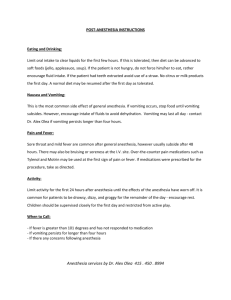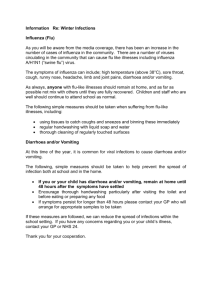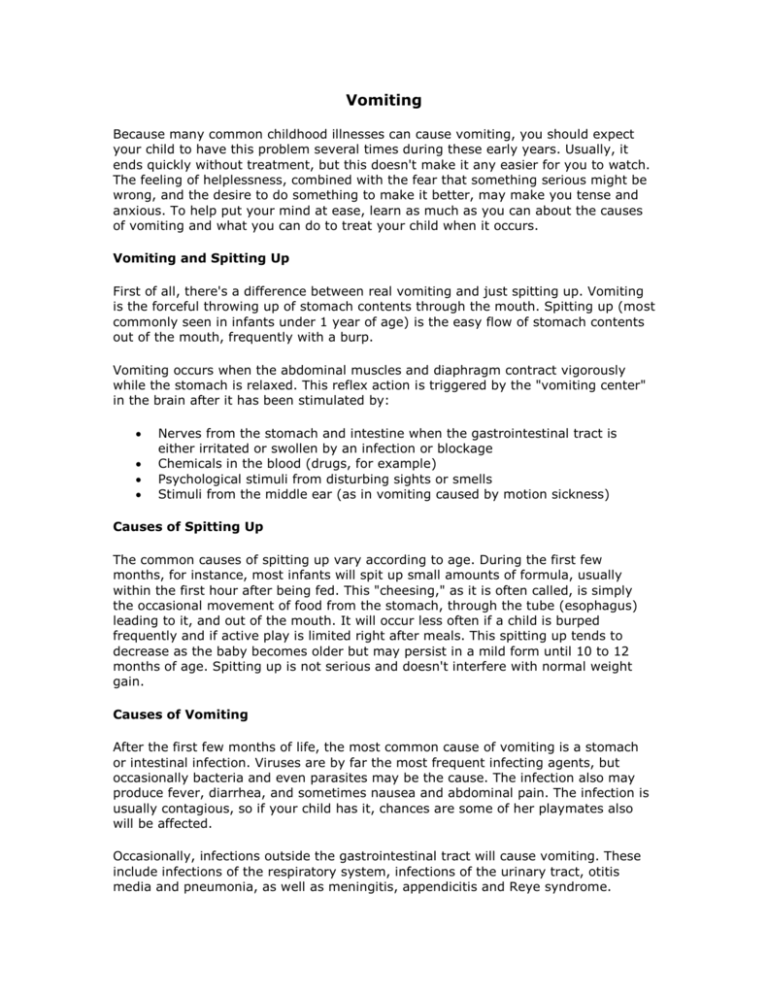
Vomiting
Because many common childhood illnesses can cause vomiting, you should expect
your child to have this problem several times during these early years. Usually, it
ends quickly without treatment, but this doesn't make it any easier for you to watch.
The feeling of helplessness, combined with the fear that something serious might be
wrong, and the desire to do something to make it better, may make you tense and
anxious. To help put your mind at ease, learn as much as you can about the causes
of vomiting and what you can do to treat your child when it occurs.
Vomiting and Spitting Up
First of all, there's a difference between real vomiting and just spitting up. Vomiting
is the forceful throwing up of stomach contents through the mouth. Spitting up (most
commonly seen in infants under 1 year of age) is the easy flow of stomach contents
out of the mouth, frequently with a burp.
Vomiting occurs when the abdominal muscles and diaphragm contract vigorously
while the stomach is relaxed. This reflex action is triggered by the "vomiting center"
in the brain after it has been stimulated by:
Nerves from the stomach and intestine when the gastrointestinal tract is
either irritated or swollen by an infection or blockage
Chemicals in the blood (drugs, for example)
Psychological stimuli from disturbing sights or smells
Stimuli from the middle ear (as in vomiting caused by motion sickness)
Causes of Spitting Up
The common causes of spitting up vary according to age. During the first few
months, for instance, most infants will spit up small amounts of formula, usually
within the first hour after being fed. This "cheesing," as it is often called, is simply
the occasional movement of food from the stomach, through the tube (esophagus)
leading to it, and out of the mouth. It will occur less often if a child is burped
frequently and if active play is limited right after meals. This spitting up tends to
decrease as the baby becomes older but may persist in a mild form until 10 to 12
months of age. Spitting up is not serious and doesn't interfere with normal weight
gain.
Causes of Vomiting
After the first few months of life, the most common cause of vomiting is a stomach
or intestinal infection. Viruses are by far the most frequent infecting agents, but
occasionally bacteria and even parasites may be the cause. The infection also may
produce fever, diarrhea, and sometimes nausea and abdominal pain. The infection is
usually contagious, so if your child has it, chances are some of her playmates also
will be affected.
Occasionally, infections outside the gastrointestinal tract will cause vomiting. These
include infections of the respiratory system, infections of the urinary tract, otitis
media and pneumonia, as well as meningitis, appendicitis and Reye syndrome.
Warning Signs of Vomiting
Some conditions that cause vomiting require immediate medical treatment, so be
alert for the following trouble signs, whatever your child's age, and call your
pediatrician if they occur.
Blood or bile (a green-colored material) in the vomitus
Severe abdominal pain
Strenuous, repeated vomiting
Swollen abdomen
Lethargy or severe irritability
Convulsions
Signs or symptoms of dehydration, including dry mouth, absent tears,
depression of the "soft spot" and decreased urination
Inability to drink adequate amounts of fluid
Vomiting continuing beyond twenty-four hours
© COPYRIGHT AMERICAN ACADEMY OF PEDIATRICS, ALL RIGHTS RESERVED.
American Academy of Pediatrics, 141 Northwest Point Blvd., Elk Grove Village, IL, 60007, 847-434-4000

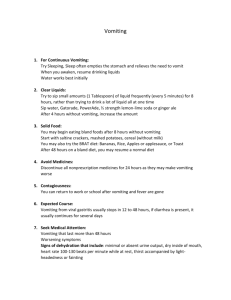
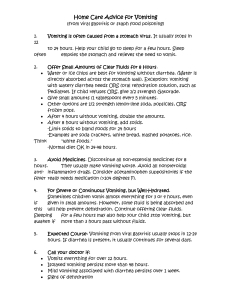
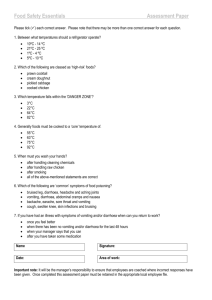
![[Physician Letterhead] [Select Today`s Date] . [Name of Health](http://s3.studylib.net/store/data/006995683_1-fc7d457c4956a00b3a5595efa89b67b0-300x300.png)
![Questionnaire used in the study Demographics GENDER: M [ ] F](http://s3.studylib.net/store/data/006712173_1-21c851410b04058d524e1b79e54e32b0-300x300.png)
